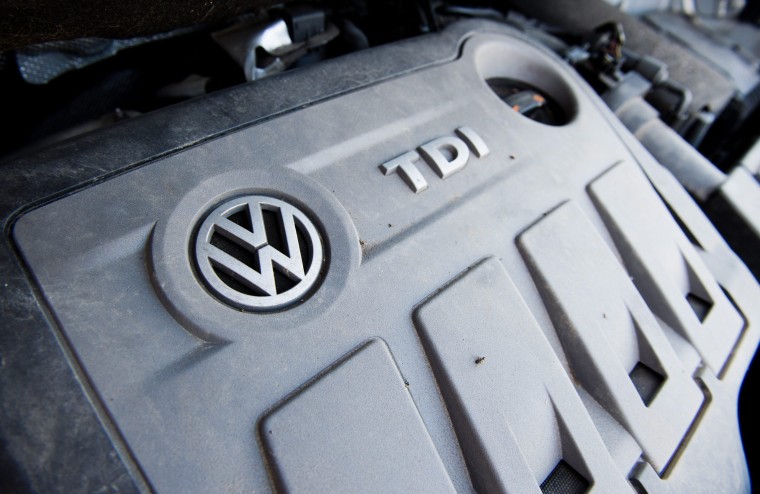Volkswagen has suspended the head of its sustainability unit, the first senior executive to be held responsible for a test program in which live monkeys were exposed to exhaust fumes from diesel vehicles to measure the health impact.
Thomas Steg, who previously worked for German Chancellor Angela Merkel, was relieved of his duties several days after the test program was revealed in a report by the New York Times. The reports have rocked the German auto industry, as well as Aachen University which confirmed a separate program in which human volunteers were exposed to low levels of smog-causing oxides of nitrogen. Both studies threaten to not only tarnish the reputations of Germany’s three main automakers: Volkswagen, BMW and Daimler-AG, but also increase scrutiny of diesel-powered vehicles.
“I will do everything possible to ensure that this matter is investigated in detail,” Volkswagen supervisory board Chairman Hans Dieter Poetsch said in a statement on Monday. “Whoever is responsible for this must of course be held responsible,” Poetsch added.
The monkey tests were sponsored by the European Research Group on Environment and Health in the Transport Sector, or EUGT, and were intended to minimize concerns about diesel emissions. They were authorized shortly before the U.S. Environmental Protection Agency announced in September of that year that Volkswagen had used a “defeat device” to rig diesel emissions tests.
The automaker subsequently acknowledged the scheme which involved both its 2.0 and 3.0-liter turbodiesel engines. They were used in over 11 million vehicles worldwide, include more than 500,000 sold in the U.S. VW has since ordered numerous recalls, agreed to buy back the vehicles sold in the U.S. that it can’t fix, and has agreed to pay about $30 billion in fines, penalties and settlements.
Other automakers have come under a cloud of suspicion, critics contending at least some manufacturers – including Euro-American Fiat-Chrysler Automobiles – have relied on similar methods to pass emissions tests in the U.S. and Europe. Since the VW scandal erupted sales of diesel vehicles have plunged in many parts of the world, and especially in Europe where so-called “oil burners” had previously accounted for as much as half of the new vehicle market.
VW, which has pledged to address ethical lapses, said earlier this week that it had identified several company managers who were involved in, or at least aware of, the monkey tests. Steg is the first to be identified by name. According to reports from Germany, Steg knew about the planned study as early as 2013.
VW said it was launching an internal investigation, as did Daimler, the parent of Mercedes-Benz, the latter maker proising to “clarify” how the study was approved. “Daimler does neither tolerate nor support unethical treatment of animals. The animal experiments in the study are superfluous and repulsive.” For its part, BMW tried to distance itself, insisting it “did not participate,” and that it “does not carry out any animal experiments.”
TThe study exposed 10 cynomolgus macaque monkeys monkeys to fumes that were pumped into a sealed chamber. The tests were carried out in May 2015 by the New Mexico-based LLovelace Respiratory Research Institute involved. Ironically, one of the vehicles used in the test was reported to be a Volkswagen Beetle equipped with the 2.0-liter diesel later found to have been rigged.
“There is nothing fair about condemning these complex, sensitive animals to suffer physical suffering and psychological torment in laboratories where they are caged and deprived of fresh air, sunshine, freedom of movement, the companionship of others, and just about everything else that makes any life worth living,” Harald Ullmann, a PETA vice president, wrote in a letter to Volkswagen CEO Matthias Müller after the testing was revealed.
There had been some concern that the automakers had also exposed human volunteers to the diesel exhaust fumes, as some initial stories following up on the NY Times report had suggested.
The research hospital at Germany’s Aachen University subsequently confirmed that it did carry out separate tests for the EUGT to study the effect of nitrogen dioxide, another exhaust gas fume, but not diesel emissions in 2013 and 2014. The University said the 25 volunteers were exposed to the gas for three hours at levels below the limits for a workplace.
That did little to appease critics, and to some raised the specter of the horrific medical tests conducted by the Nazis during World War II.
“These tests on monkeys or even people are in no ethical way justifiable and raise many critical questions about those who are behind the tests,” German government spokesman Steffen Seibert said during a news conference in Berlin.
